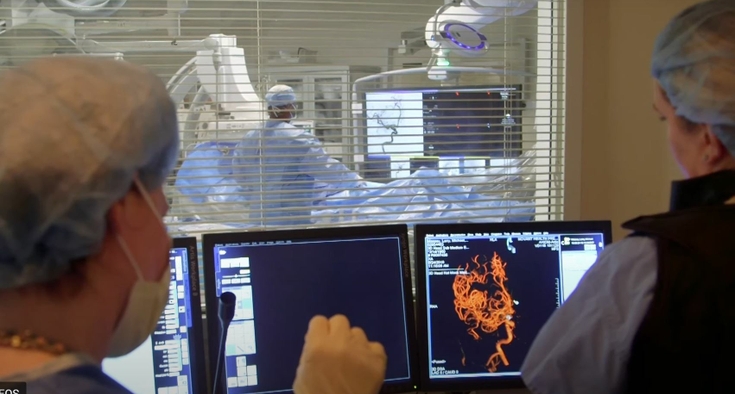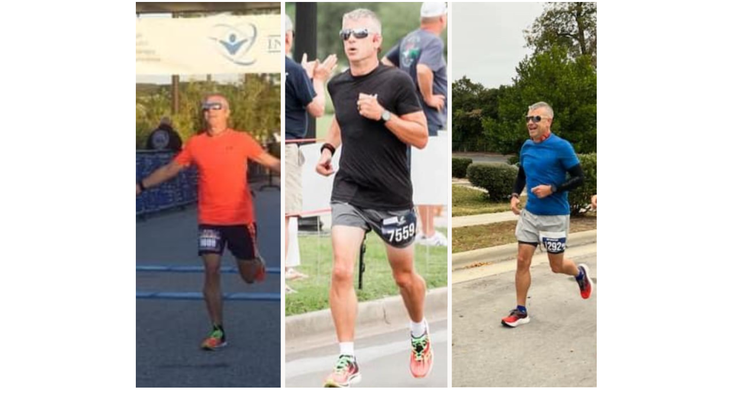May 11 started as a seemingly normal Saturday morning for the Verdures in their Bolivia, North Carolina, home. Lisa Verdure was awake and brewing coffee at 6:30, while her husband, Michel, and their dog continued to slumber. Moments later, Michel shuffled into the room.
When he opened his mouth to talk, gibberish came out. His left arm hung limp at his side. Confused, Lisa focused on Michel’s face and saw the left side of his face sag.
Lisa recognized three signs that Michel was suffering from a stroke: speech difficulty, immobility on the left side of his body and drooping on one side of the face. She knew time was critical.
Acting quickly, Lisa asked Michel to lie down on the couch before she called 911. But Michel tried to bat the phone out of her hands.
“I didn’t know anything was wrong with me,” he said.
EMTs transported Michel to Novant Health New Hanover Regional Medical Center, a certified comprehensive stroke center about 30 minutes away in Wilmington. He remembers the EMT telling him, “They are specialized in strokes.” And from then on, Michel said, “The stars were aligned.”
Award-winning stroke care.
A comprehensive stroke team at the ready
When Michel arrived at the hospital, the stroke team was waiting for him and immediately took him in for a CT scan.

While he was aware of what was happening, his speech was still garbled, and the left side of his body was limp. The scan revealed a blood clot in the distal M2 segment of Michel’s middle cerebral artery. Neurosurgeon Dr. Justin Cappuzzo explained this location is like a “little country side road” if you look at a map of the brain.
Michel was wheeled to the neurology institute’s angiography suite, filled with sophisticated equipment to help Cappuzzo remove the clot through a thrombectomy. Thrombectomy, a minimally invasive procedure that allows a neurosurgeon to suction the clot out of the brain without opening the skull, has existed for about 20 years. However, the procedure has traditionally been limited to main blood vessels that are wide enough to accommodate a catheter, the suction tube. Recent advancements allow Cappuzzo and the rest of the neurosurgery team to remove clots causing ischemic strokes even in slender blood vessels – the little country side roads of the brain.
For the thrombectomy, Capuzzo inserted a thin wire and catheter into Michel’s right wrist, then traveled through the blood vessels to reach and remove the clot. Within just 15 minutes, the procedure was complete. Cappuzzo watched as Michel made a total recovery right there on the surgical table. His speech and mobility returned almost instantaneously.
Top scores for safety in NC
Novant Health received the most ‘As’ for patient safety in North Carolina
from The Leapfrog Group. With a focus on safety, quality and patient
experience, the national, industry-leading nonprofit, evaluates and
assigns letter grades ranging
from A to F to hospitals across the country. Novant Health’s hospitals with “A”
grades outperform 70% of hospitals nationwide for safety and quality.
“I was awake the whole time,” Michel said. “When he was done, without even being asked, I took my left hand and I moved it. My fingers were moving perfectly. It was like a switch as soon as he removed the clot.”
‘Everything worked out the way it was supposed to’
As Michel recovered in the ICU moments later, he and Lisa inhaled a deep breath, taking in everything that had happened so quickly in the last couple hours. One day later, Michel went home.
“Everything worked out the way it was supposed to, by the book,” Michel said. “And it starts with Lisa acknowledging immediately and making the right decision by calling 911.”
Lisa, a retired physical therapist, credits a long career in health care for granting her the knowledge to recognize what was wrong and take fast action. Being in the hospital, the ICU in particular, can be frightening, she pointed out, and Michel’s care team ensured the Verdures understood what was happening at every moment.
“I have a very, very critical eye, and the nursing was exceptional,” she said. “They were very informative, because obviously we were going to through a scary thing. … We always knew what to expect. For me, it was a very comfortable experience.”
Michel agreed that a big part of what made the ICU – a place you never really want to end up – a much less scary experience was the level of personalized attention they both received.
“Dr. Cappuzzo was really generous with his time,” Michel said. “On top of being a great doctor, he is also a good human.”
Lisa chokes up when she talks about how grateful she is for Cappuzzo.
“It was very important to me to be able to thank him,” she said. “I have a very clear picture in my head of what could have happened.”
Protecting a future
What was at stake is something that Lisa and Michel have worked very long and hard for. The couple just finished building their dream home a few months ago, after living and working in Miami, Florida, for 31 years. Lisa is fully embracing retirement while Michel, a celebrated cruise ship photographer who is originally from Paris, is semi-retired, still working when an opportunity is particularly exciting. His career has taken them to destinations around the globe, one of their favorites being Antarctica, for its otherworldly beauty.
Now that the couple is finally starting to slow down a bit and embrace a leisurely Coastal Carolina lifestyle, it’s sobering for them to recall how this stroke could have dramatically changed their lives had they not received such timely and attentive care.
To ensure his brain doesn’t form another clot, Michel is taking a prescription anticoagulant and following up with health assessments. He’s also embracing antistress measures and bought a boat so that he and Lisa can enjoy the local waterways. While the memory is fresh, there’s no physical evidence of Michel’s thrombectomy.
“It’s like nothing happened,” he said. “I think it’s because everything worked perfectly, the way it was supposed to.”











